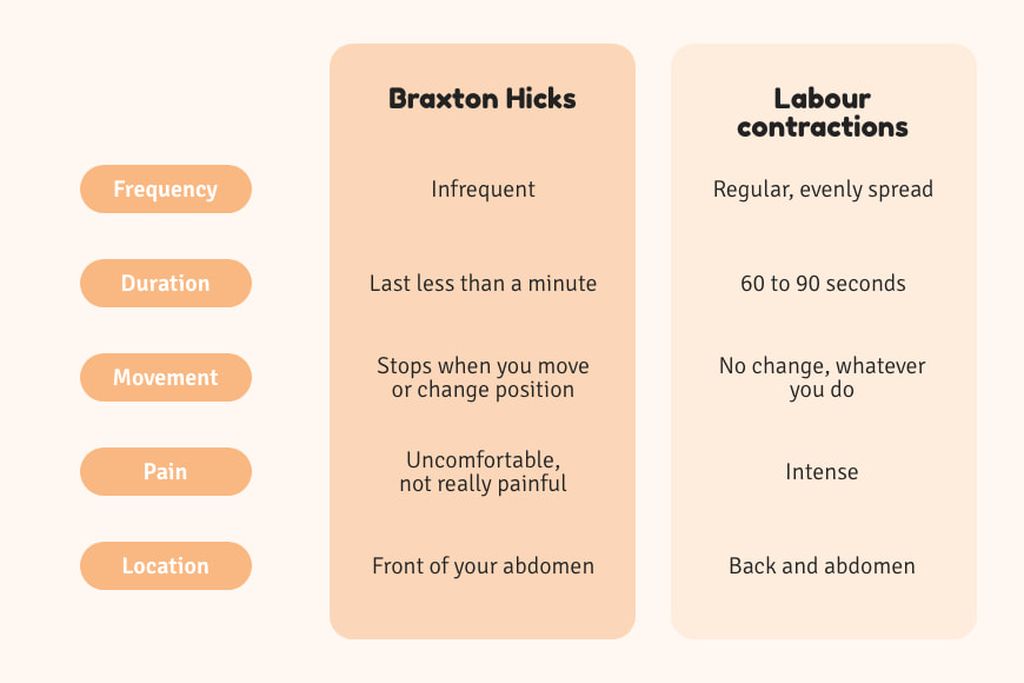What do Braxton Hicks contractions feel like, and when do they start?
Braxton Hicks contractions are genuine contractions, but they’re not labour – some people say they are practice contractions and Nature’s gentle way of getting you ready for the real thing. Here we’ll take a look at some of the most frequently asked questions about Braxton Hicks. What are Braxton Hicks contractions? When might you experience them? How do Braxton Hicks contractions differ to true labour contractions? What do Braxton Hicks contractions feel like? And how can you deal with the discomfort when you get them?
Index

What are Braxton Hicks contractions?
Number one fact: like deep joy, indigestion and food cravings, Braxton Hicks are a perfectly normal part of pregnancy. But many women don’t even notice them. Braxton Hicks are intermittent uterine contractions that may start as early as 12 weeks, but it’s quite common not to feel anything until well into your second or third trimester. Sometimes Braxton Hicks contractions are known as false labour – read on and we’ll tell you how to spot the difference between Braxton Hicks and true labour.
Why are they called Braxton Hicks contractions?
Braxton Hicks contractions are named after the eminent Victorian doctor and obstetrician John Braxton Hicks. He was the first physician to notice that women could experience contractions all the way through pregnancy, not just during labour.
What do Braxton Hicks contractions feel like?
Women describe a whole range of experiences that go with Braxton Hicks. They talk about feeling a mild stitch that’s gone almost as soon as it arrives. Braxton Hicks contractions may be uncomfortable, like mild menstrual cramps. but they are not usually painful. Like any other kind of contractions, you'll feel your uterus, lower abdomen or groin tighten and then relax.
Sometimes during Braxton Hicks it might suddenly feel as though your baby has become a solid, hard ball, or you may notice your belly changing shape. Some women experience Braxton Hicks and mistake the feeling for their baby turning over.

How do I know I'm experiencing Braxton Hicks contractions?
If what you’re experiencing feel like this, chances are it’s Braxton Hicks contractions.
Your contractions have no regular pattern.
They vary in intensity but get weaker rather than stronger.
They’re uncomfortable, but not really painful.
They’re infrequent or come and go in a random way.
They stop when you move or change position.
You only feel them in the front of your abdomen.
When do Braxton Hicks contractions start?
Braxton Hicks can start anytime after 12 weeks or so and carry on throughout your second and third trimesters.
How long do Braxton Hicks contractions last?
Braxton Hicks contractions usually begin any time after around 12 weeks, and carry on throughout your pregnancy. Braxton Hicks contractions tend to intensify as the months go by. But not all women experience this.
What causes Braxton Hicks contractions?
Nobody really knows what can trigger Braxton Hicks contractions. For some women it might seem as though just about anything can bring them on - moving around or sitting still, being dehydrated or desperate for the loo – and they just can't win! But we do know that they’re more likely to happen:
While you’re being very active, or just after exercise.
During sex.
When you have a full bladder.
When you’re dehydrated.
At the end of the day.

Can overdoing it cause Braxton Hicks contractions?
Just when everyone's telling you to rest, suddenly there's so much to do. Moving house so you can have a nursery, then getting the nursery together, squeezing in ante-natal clinics... True, Braxton Hicks can be brought on by lots of moving around, even just a long walk or a run. But Braxton Hicks can just as easily be triggered by long periods of sitting, too. So keep on keeping fit. It's good for you, and good for your baby, too.

How can I tell the difference between Braxton Hicks contractions and true labour?
When you’re getting close to your due date, it’s easy to mistake Braxton Hicks contractions for the first signs of labour. That’s partly to do with the fact that you’re expecting labour to begin any day so you’re on the watch for any signs, and also because Braxton Hicks contractions do actually change in the last days and weeks. Braxton Hicks get more regular, closer together and more uncomfortable. But there are some key differences that will tell you whether this is the real thing or just another episode of Braxton Hicks contractions:
Irregular contractions
Braxton Hicks contractions are irregular, and don’t get any closer together during an episode.
Regular contractions
In labour, contractions are evenly spaced and get closer together over time.
Shorter or random lengths
Braxton Hicks contractions usually last less than 30 seconds, though they can last as long as a couple of minutes.
Longer & more equal in length
Labour contractions typically last about 60 to 90 seconds
Easier when you move around
Braxton Hicks contractions will stop when you walk, rest, or change position.
No change whatever you do
Labour contractions continue no matter what position you're in or how you move.
Variable strength
Braxton Hicks contractions are usually weak (or may be strong and then weak).
Increasing in strength
In true labour, contractions steadily get more intense.
The feeling is only in one place
You only feel Braxton Hicks contractions in the front of your abdomen.
The feeling moves around
In labour, contractions feel like they start in your back and then move to the front. Of course, as well as changes in how your contractions feel, there are other signs that the big event has begun – like your water breaking. If you think you're in labour, or even if you’re just not sure, always call your doctor or midwife.
Why do Braxton Hicks contractions change when you get closer to labour?
Your body starts getting ready for the birth long before it happens. It’s part of Nature’s magic. Around two weeks before your due date, your cervix will probably have begun to ‘ripen’, gradually getting softer in preparation for what’s to come. Your Braxton Hicks contractions may get more intense, more frequent and more uncomfortable. Unlike your earlier Braxton Hicks contractions, which don’t really affect the cervix (the entrance to the womb) in any way, these later ones may help it to ‘efface and dilate’ – medical jargon for thinning out and opening up. Think of later Braxton Hicks contractions as 'practice contractions' and the final stage of training for the big event!

Pre 37 weeks, when should I call my doctor or midwife about Braxton Hicks?
It can sometimes be hard to tell the difference between Braxton Hicks contractions and the early signs of preterm labour. If you’re not sure, play it safe and call your doctor or midwife. And contact them straightaway if you haven’t yet reached 37 weeks and you’re experiencing any of the following:
You have any vaginal bleeding or discharge.
Your waters have broken.
You have strong contractions every five minutes that last 30-60 seconds.
The pain doesn’t go away when you rest.
The pain is severe.
You’re worried about your baby’s movements.
Post 37 weeks, when should I call my doctor about Braxton Hicks?
Your doctor or midwife will probably have spoken to you about Braxton Hicks contractions, the differences between these and true labour, and when you’ll need to call them. But always contact a medical professional if:
Your waters break (with or without contractions).
You have vaginal bleeding (more than just spotting).
Your contractions are getting more regular and more intense.
Your contractions are coming five minutes (or less) apart.
You have constant, severe pain.
Are Braxton Hicks painful?
Braxton Hicks contractions aren't usually painful, but they can be uncomfortable – and sometimes so sudden they literally take your breath away. They’ve been compared to menstrual cramps or a stitch, described as twinges, a tingling or a tightening feeling. You might feel Braxton Hicks contractions on top of your bump or lower down in your abdomen. Every woman’s experience is unique, and many women have them without even noticing they've had a single Braxton Hicks contraction.

What can I do to make Braxton Hicks less painful?
There is no treatment as such for Braxton Hicks contractions. But there are plenty of ways to minimise the discomfort, depending on what’s triggered your discomfort this time.
Changing position.
Lying down and resting after being very active.
Going for a walk if you’ve been sitting down for a long time.
A massage or a long soak in a warm (not hot) bath.
Deep breathing and relaxation exercises
Drinking plenty of water as they can sometimes be caused by dehydration.
A warm cup of tea or milk.
Emptying your bladder can relieve internal pressure.
How can I find out more about Braxton Hicks?
We hope you've found this useful, and you now feel as though you know a bit little bit more about Braxton Hicks contractions, how to spot when you're experiencing them and what to do to minimise any discomfort they might cause. If there's anything else you'd like to know about about Braxton Hicks contractions, do talk to your midwife, your doctor or whoever provides your antenatal classes.
The information in this article is for general information only and is not a substitute for professional medical advice. Consult a qualified healthcare professional for personal advice.




